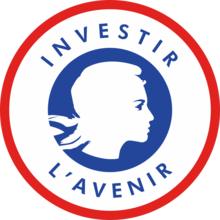At the beginning of 2022, the ThARGET programme teams of SIRIC ILIAD are now partners in the Hospital-University Health Research (RHU) project OPERANDI led by Professor Valérie Vilgrain of the Beaujon Hospital (AP-HP), among the 17 projects selected from 89 applications.

Supporting innovative and large-scale research projects in the field of health, is the objective of the “University Hospital Research” (UHR) call for projects from the Programme d’investissements d’avenir (PIA). Focused on translational research, the RHU projects bring together academic, hospital and business actors.
The OPERANDI project, led by the AP-HP, focuses on digestive cancers and in particular on hepatocellular carcinoma (HCC) and gastroenteropancreatic neuroendocrine tumours (GEP-NET), two tumours with significant common features, which can be very difficult to distinguish, even for pathologists.
Improve the efficacy of targeted radionuclide therapies in digestive cancers: “better select, better treat and better monitor”
Hepatocellular carcinoma (HCC) is one of the most common malignancies, regarded as the sixth most common cancer and the third leading cause of cancer-related death, while gastroenteropancreatic neuroendocrine tumours (GEP-NETs), long thought to be rare tumours, have increased in incidence over the past decades.
Both digestive cancers are currently treated with radionuclide targeted therapy (RTT). This advanced method consists of targeting cancer cells through the administration of radionuclide-labelled biomarkers or glass microspheres containing a radioactive isotope. Although very effective, this ‘standard’ approach makes it difficult to classify patients and monitor response to treatment. This leads to a waste of time for non-responders, who could benefit from earlier treatment modifications.
The main objective of the OPERANDI project is to propose new diagnostic approaches for the management of patients who have been identified for TRT, by significantly improving their selection, treatment and follow-up: “better select, better treat, and better monitor”.
OPERANDI : A project in which the SIRIC ILIAD teams are involved
The RHU OPERANDI project brings together clinical and research teams, among which are the nuclear medicine teams of the ThARGET programme of SIRIC ILIAD:
- Françoise Kraeber-Bodéré
- Catherine Ansquer
- Clement Bailly
- Thomas Carlier
- Mickael Bourgeois
- Ferid Haddad
- Cyrille Alliot
- Michel Cherel
- Joëlle Gaschet
- Alain Faivre Chauvet
- Simon Stute
For 10 years now, the nuclear medicine department of the Nantes University Hospital, the CRCI²NA and ARRONAX have maintained a very close collaboration, strengthening the links between clinicians and researchers on numerous fundamental and translational studies.
The SIRIC ILIAD teams are developing new theranostic and TRT modalities to ” better select ” and ” better treat “
As part of the RHU OPERANDI, the nuclear medicine teams in Nantes are providing their expertise in two of the project’s objectives: “better select” and “better treat”.
One objective of the Nantes research group is to improve the effectiveness of TRT, in particular in aggressive or recurrent tumours, by targeting other biomarkers, or by optimising theranostic approaches (contraction of the words “therapy” and “diagnosis”) or by using emitters that are more toxic to cancer cells, such as α emitters. Another objective is to develop new molecular imaging methods for the screening of patients before the therapeutic phase, in order to optimise theranostic procedures.
Congratulations to all the teams involved in the project!
In particular, the CRCINA chemistry group has developed a number of patented approaches for the labelling of 211At and, together with GIP ARRONAX, has built up an industrial collaboration with Telix Pharmaceuticals on 211At.

